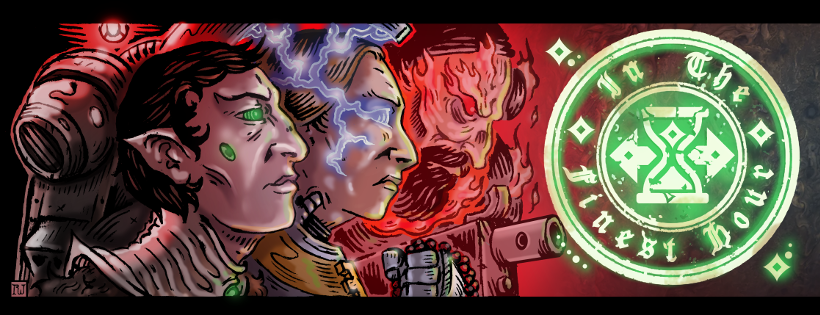We’d all rather win games than lose them, but sometimes things don’t go as smoothly as we want.
So how do you keep in when things start to go south, and how do you recover from mistakes or bad dice? This week In the Finest Hour looks at playing from a losing position and how you can maximize your score as well as your chances of pulling out that victory.
We also look at how to handle bad matchups, risk assessment, how to shift your priorities and playstyle, and more in this underdog episode.
[display_podcast]



Love how the Brandon Grant LVO myth by now has evolved from Brandon Grant losing the Castellan at top of turn 3 (after eating 3 rounds of shooting from one of the shootiest armies at the time, or 50% of the max damage output of that army in a 6-turn game) and riding is ~6 point lead (+ ground control) to the last turn to Brandon Grant losing his Castellan on Turn 1 to a sneezing Storm Guardian and clawing his way back from being down 57 points or so.
I know there is a narrative of Hero Brant slaying the vile, cheating British Villain, and it’s not a bad yarn.
However, removing the “names” and looking at the game state of the LVO final turn-by-turn in light of the podcast’s topic, it was Alex playing from behind every single turn of that game, failing to kill the Castellan turn 2, which he probably needed to do to win, and almost but not quite clawing his way to a victory at the end, where it not for Brandon (smartly) having chosen ground control.
Yes, I was confusing that for one of Brandon’s other games where I believe he did lose the Castellan on the first turn, although I could be thinking of someone else.
Setting aside the issue of Alex’s conduct, it does raise the issue of what we mean by “behind” in that scenario. Behind on points? Certainly he was, but that list expects to be losing on points for a significant portion of the game; it’s part of the game plan. Sacrificing points early to develop a superiority of units on the board is a very common strategy and doesn’t necessarily mean you’re losing the game or even in danger of losing it; that is a much more complex assessment, and being able to make that judgement is basically the whole point of having commentators to watch and interpret a game for people.
Hmm… in a “generic” Eldar vs. Castellan match-up, having the Eldar whiff on turn 2, fail to kill the big knight (perhaps because Doom doesnt go off or something along those lines, .. not sure if that is exactly what happened to Alex), thus having …
… a likely point swing in the kill/kill more field and
… having a 1CP-to-top-tier Castelan get in another round of shooting at all the Eldar units that can decimate the Guard infantry and
… having to devote a good bit of another shooting phase to finally finish of the Castellan instead of clearing ObSec units…
… IMO is pretty much a definition of a bad turn that puts an Eldar player into the position of “playing from behind” as described in the podcast.
Similarly, you make the argument that sacrificing Mortarion to buy the rest of your army 2 turns is a smart play. The same would apply to sacrificing a Castellan to buy the rest of your army 3 turns (doubely so if the Castellan takes down some Scatter Bikes while he’s there).
How would this not qualify as the Eldar player “playing from behind” by the points you outline in your podcast (which was very good, btw), even IF the Eldar player had been up by a point or two at this moment in the game (which Alex was not in the LVO final)?
Brandon did lose his Castellan top of turn 1 at the SoCal Open final game and still went on to win it with a brilliant move in end game. It was truly impressive.